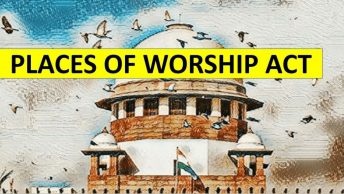The state of Assam has witnessed several violent protests over the last few months because of the proposed amendments to the Citizenship Laws of the country. Terming the bill as “Anti-Assam,” the Asom Gana Parishad (AGP) which forms the part of the ruling NDA alliance in the state (led by the BJP) threatened to withdraw support from the Government if the Citizenship Amendment Bill is passed. It is also being argued that the proposed changes would derail the ongoing efforts to update the National Register of Citizens (NRC) in the state and make Assam a dumping ground for the “Hindu Bangladeshis.” This blog explains the proposed changes in the Bill and why Assam has been mired in the center of protests on this law.
Although the question of who would become the bearers of rights in the new Republic is a vexed question for each country, the problem accentuated for India for primarily two reasons- one, the massive movement of people across the Eastern and Western border during the partition and second, the frequent incoming of refugees due to porous borders and instable neighborhood. Remarking at the complexity of drafting citizenship laws, Dr BR Ambedkar mentioned– “Except one other article in the draft constitution, I do not think that any other article has given the drafting committee such a headache as this particular article. I do not know how many drafts were prepared and how many were destroyed as being inadequate to cover all the cases which it was thought necessary and desirable to cover.”
-
What is the existing paradigm of regulation which governs Citizenship Laws in the country?
The laws governing citizenship in India are broadly covered under Part II of the Constitution and the Citizenship Act of 1955. Besides, the Passports Act, 1967 and Foreigners Act, 1946 regulates other vexed areas relating to questions of immigration, foreign travel, and entry of aliens into India etc. Important for our purpose here is the Citizenship Act which provides for the acquisition and determination of Indian citizenship. Section 2(b) of the Act defines an illegal immigrant as any person who (i) who enters India without a valid passport or with forged documents, (ii) stays in the country beyond the visa permit.
-
What changes are being proposed by the Citizenship Amendment Bill, 2016?
The proposed law amends the existing definition to exclude individuals from the minority religions of the Muslim dominates countries from the ambit of illegal immigrants. More specifically, Section 2 of the Bill provides that Hindus, Sikhs, Buddhists, Jains, Parsis and Christians from Afghanistan, Bangladesh and Pakistan would not be considered as ‘illegal immigrants’ under the Act and thereby not penalized for illegally entering the country. Furthermore, the Bill goes a step ahead by greatly relaxing norms and procedures to avail citizenship of India. First, it reduces the requirement of 11 years to acquire citizenship by naturalization to only 6 years of ordinary residence for such immigrants. Second, it reduces the registration fee to Rs 100 from Rs 3000 and more importantly, delegates the authority from the Union Government to the district magistrate for speedy processing of applications.
-
Does the Bill suffer from any legal fallacies?
It has been argued that the selective application of the Bill on the basis of religion is violative of the equality clause under Article 14 and the principle of secularism- which forms one of the basic feature of the Indian constitution. Moreover, if the motive as the Bill propounds is to protect the religiously persecuted people, the exclusion of Muslims falls in troubled waters. Muslims are considerably discriminated against and exploited in the neighboring countries of China, Sri Lanka and Myanmar whose demands for asylum in India have fallen on deaf ears. The decision to deport back the Rohingya refugees to Myanmar is just one case in point. The bill also overlooks certain sects of Islam like Shias and Ahmediyas which face prosecution in the notified countries.
The bill also incorrectly terms individuals of minority religions entering the country are migrants when in reality they are akin to refugees. The word migration refers to the voluntary movement of people primarily for better economic advantages. The purpose and intention of the Bill as stated by the Home Minister and provided Bill is to provide shelter to vulnerable, religiously persecuted people whose fundamental rights are at risk. The correct terminology is important because the laws and policies for migrants and refugees are entirely different.
-
What have the protests intensified in Assam?
The massive waves of immigration from Bangladesh during the liberation war changed the demographic structure of Assam resulting in a staggering growth of Muslim population in the state. This unchecked immigration and consequent reduction of Hindu population caused resentment amongst the native Assamese population. To this, the Congress Government in the Centre responded by enacting the Illegal Migration Detection Act which provided for detection and expulsion of illegal migrants from the state.
However, contrary to the Foreigners Act which imposed a burden on the accused to prove their credentials, the act shifted the burden to the complainants- leading to the inevitable consequence of only a handful people being deported. The failure of the Act to subdue the crisis forced the Congress Government to sign the Assam Accord with the All Assam Students Union (AASU) which was leading the protests. Under the terms of the Accord, any individual entering the state after March 25, 1971- the day of Bangladesh liberation war would be termed as an illegal immigrants. This left thousands of Bangladeshi Muslims disenfranchised and incapable of obtaining Indian citizenship even after one and one decade of residence in India. The NDA Government in Centre later amended Section 3 of the Citizenship Act in 2003 to further curtain the citizenship rights of children born to such illegal immigrants.
-
How will the Bill affect the Assam Accord?
Pursuant to the Assam Accord and under the supervision of the apex court, Assam is currently updating the National Register of Citizens (NRC). The NRC seeks to identify the bona-fide citizens of the state by weeding out Bangladeshi nationals who entered the state after the midnight of May 24, 1971- the day liberation war started. The NRC was first published after the 1951 census when parts of Assam went to East Pakistan. The first draft of the NRC which was published in January contained names of only 1.9 crore citizens out of the total 3.29 crore applicants- leading to concerns of statelessness and disenfranchisement for a vast majority of people. The final draft is due to be published by July 30.
The proposed Bill if passed would result in awarding citizenship to a large number of people otherwise would have been ineligible. This is because although the Bill would grant citizenship to non-Muslim refugees from neighboring countries, the NRC does not distinguish migrants on the basis of religion. It will consider deporting anyone who has entered the state illegally after the cut-off date but if the Bill is passed, the non-Muslims would not have to go through any such process.
-
How are political parties reacting to the situation?
The Bill is seen as a furtherance to BJP’s election promise to grant citizenship to Hindus from Muslim-majority countries. In its 2014 Parliamentary elections manifesto, BJP declared India to be a natural home for persecuted Hindus around the word and welcomed them to seek refuge in India. However, the Assam unit of the BJP is caught in a spot which has failed to support the bill in unequivocal terms. The coalition partner AGP which considers the Bill anti-thetical to the cultural and linguistic identity of the native Assamese has in even threatened to cut ties with the BJP.
The Congress though has criticized the Bill for the communal nature of the Bill however the Barak valley unit of the party while not supporting the Bill officially and not opposed it either. This is because the Bill has found support amongst the people of Bengali-dominated Barak valley of the state who feel that the Bill would end the alienation of Bengali Hindus living in Assam. The protests have however been intense in the Assamese-dominated Brahmaputra valley creating a geographical-linguistic fault line in the state
-
What is the future of the Bill?
The Bill is currently being examined by a Joint Parliamentary Committee (this is only the 11th time at a JPC is being constituted in the history of India parliament). The JPC chairperson Rajendra Agarwal ruled out the possibility of submitting the report during the monsoon session of parliament.
Most recently, rattled by the widespread protest in the state against the proposed changes, the RSS has also temporarily shelved the plan to support the Bill. Realizing the difficulty in getting the Bill passed, the Home Ministry has now instead responded by greatly liberalizing the process for granting long-term visas (LTVs) to minorities from Pakistan, Afghanistan and Bangladesh. Whether the Bill will see the light of day remains uncertain, but it has surely been successful to rattle the delicate links to citizenry of the country.








Thanks for sharing. I read many of your blog posts, cool, your blog is very good.
Your point of view caught my eye and was very interesting. Thanks. I have a question for you.
Thanks for sharing. I read many of your blog posts, cool, your blog is very good.